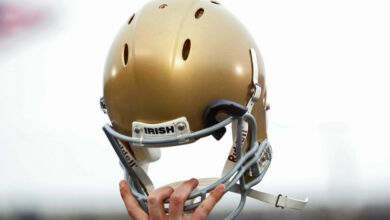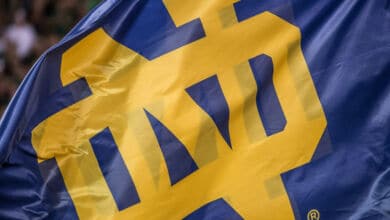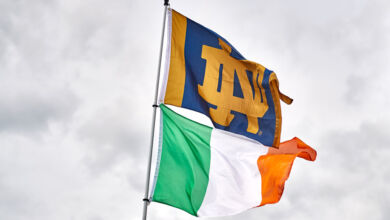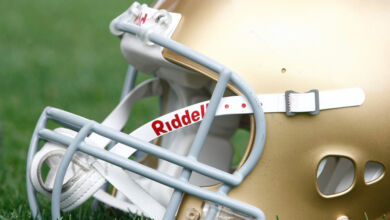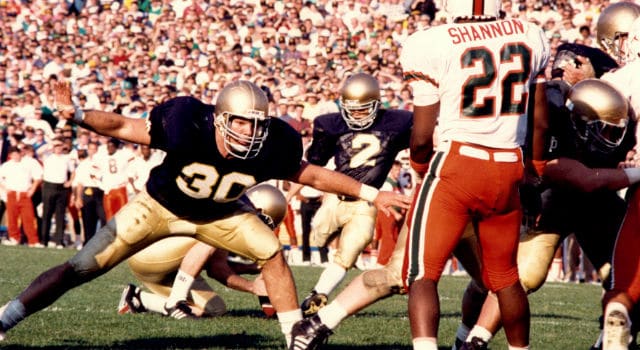
From 1971 to 1984, the Notre Dame Fighting Irish and the Miami Hurricanes met every year, with the Irish winning the first 10 matchups. That dominance ended in the 1980s, with the matchup reaching nasty proportions in 1985 when Miami was accused of running up the score in a 58-7 rout. Two years later, the Hurricanes shut out Notre Dame, 24-0, with Miami taunting soon-to-be Heisman winner Tim Brown during the clash.
That set the stage for the October 15, 1988 classic that became known as the Catholics vs. Convicts game. The Irish’s status as a Catholic school and the arrests of multiple Hurricane players in recent years served as the basis for the phrase. The term became a rallying point, with some Notre Dame students selling t-shirts with the phrase out of their dorm room. Also indicative of just how strong the vitriol was from Irish fans could be seen in another t-shirt emblazoned with the phrase, “You can’t spell scUM without UM.”
- Rivalry Background: Notre Dame dominated Miami until the 1980s, when tensions escalated, peaking in the 1988 “Catholics vs. Convicts” game.
- Game Significance: The 1988 game featured intense emotions, pre-game brawls, and dramatic plays, symbolizing the fierce rivalry.
- Key Players and Coaches: Lou Holtz’s Notre Dame faced Jimmy Johnson’s Miami, with standout players like Tony Rice and Steve Walsh.
- Aftermath and Legacy: Notre Dame’s win led to a national championship, while Miami’s defeat ended their streak, marking a historic college football rivalry.
The Coaches
Lou Holtz was in his third season leading Notre Dame and had effectively erased the miserable Gerry Faust era that ended in that 1985 pounding by Miami. The fourth-ranked Irish entered the Miami clash with an eight-game home winning streak and a 5-0 record and were again a national title contender.
Jimmy Johnson was in his fifth season at Miami and was looking to lead his squad to a second straight national championship. The Hurricanes were the top-ranked team in the nation with a 4-0 record, with a tight one-point win at Michigan the previous month being their only challenge to this point. Miami entered the matchup with a 36-game regular season winning streak and had won their last 20 road contests.
The Key Players
Notre Dame quarterback Tony Rice was flourishing in his second season as a starter, with his legs helping lead the team in rushing. However, it was the Irish defense that stood out that season, with players such as Chris Zorich, Frank Stams and Michael Stonebreaker playing key roles in shutting down opponents.
Miami was dominant on both sides of the ball, with quarterback Steve Walsh, running back Cleveland Gary and wide receiver Andre Brown delivering much of the offensive firepower. That year’s defense for the Hurricanes ended with two shutouts and five games with opponents scoring only a field goal, with defensive end Bill Hawkins, linebacker Randy Shannon and defensive back Bubba McDowell some of the central performers.
The Game
Simmering emotions boiled over even before the game started when the two teams began brawling in the tunnel leading to the field. Taunting again was the spark for this scuffle, which required police to end it and also serve as protection for the Hurricanes when they came back on the field.
Once the game got underway, football became the main focus again. The Hurricanes fumbled on their opening series, with Chris Zoric recovering for the Irish but neither team made much headway in the opening portion of the first quarter. Notre Dame finally broke through, putting together a 75-yard, six-minute drive that ended with a
After each team coughed up the ball, Miami took advantage of the Irish miscue to tie the game up. Notre Dame responded with a five-minute drive that took 11 plays and ended with a Rice touchdown to Braxston Banks, then doubled their advantage when Pat Terrell’s 60-yard pick-six made it 21-7 in favor of the Irish.
In the final 5:42 before halftime, the Hurricanes roared back to knot the score, tallying the first score on a 23-yard touchdown pass. After Notre Dame was quickly stopped, Walsh needed less than a minute to notch another touchdown, connecting with Gary on a 15-yard score with 21 seconds to go before the break.
The Irish took back the lead in the third quarter after a fake punt attempt by Miami imploded, with the key play being a 44-yard pass to Ricky Watters. Yet another mistake by the Hurricanes led to a Notre Dame field goal in the final minute of the third quarter, giving Holtz’s squad a 10-point lead with 15 minutes remaining.
Miami once again charged back, but a promising drive stalled and forced them to settle for a 23-yard field goal. After stopping the Irish, the Hurricanes lost the ball on the most controversial play of the game with just over seven minutes to play. Gary had seemingly gotten a key first down, but the play was ruled a fumble with Notre Dame gaining possession.
The Irish were quickly forced to punt, but the seventh and final turnover of the day for Miami gave Notre Dame the ball back with less than four minutes remaining. However, Rice was stripped of the ball by Shannon at the Irish 14 with 1:45 to go, with Walsh hitting Brown on an 11-yard score one minute later.
Instead of settling for a tie, Johnson chose to try for the win. Terrell once again came up clutch by knocking the ball away. An onside kick attempt by the Hurricanes came up short, with Notre Dame running out the clock to clinch the game.
The Aftermath
The Irish used the momentum from this matchup to go on and capture the school’s first national championship since 1977. On the flip side, Miami’s only defeat that year was a crushing blow that prevented them from capturing a second consecutive title. The following season, the Hurricanes were again national champions with an 11-1 mark.
Following the game, Holtz indicated that a pause might be needed once scheduled games between the two schools during the next two seasons were played. In his opinion, the overheated atmosphere needed a cooling-off period that ended up lasting two decades until the two teams met again in the 2010 Sun Bowl.
Since that postseason clash, the two schools have met three times, with the Irish winning the first two games and Miami winning the last matchup in 2017. Originally scheduled to face each other in 2024, the game was pushed back a year due to scheduling issues involving the Hurricanes.
Rivalries generally have at least a strain of animosity running through them, one of the reasons why emotions can run so high before, during and after games. In the case of Notre Dame and Miami, the Catholics vs. Convicts battle served as the flashpoint for one of the most memorable games in Irish football history.
